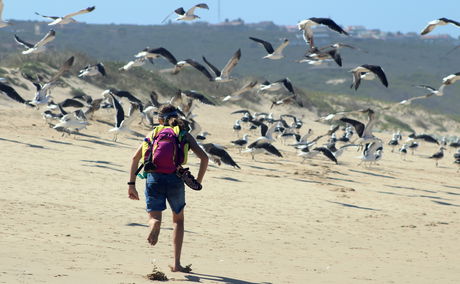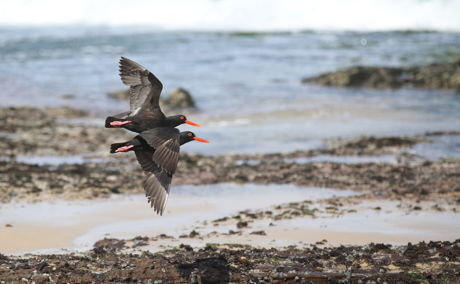Cassandra Dodd - Must-Visit Places Along the Oystercatcher Trail
Spider and Wasp
Cool nature on everyday business
Outside the Sandpiper Leisure Center, home of the Oystercatcher Trail, a pompilid or spider wasp as it is more commonly known captured and paralyzed a rain spider. This behavior of hunting and killing spiders often larger than themselves provides food for their larvae. A female wasp searches the ground and tree trunks for a spider, the prey must be large enough to serve as food for the larvae’s entire development. Once a prey is located she will give a paralyzing sting. She will then carry the spider into a burrow she has constructed herself or use the spiders own burrow or tunnel. Once safely in the burrow she will lay a single egg in the abdomen of the spider and close the entrance to the burrow. The size of the spider will determine whether the egg will develop into a male or female wasp. Larger spiders will be host to future female wasps while smaller ones to males. When the egg hatches the larvae feeds on the spider breaking through with its mandibles.
Adult spider wasps are nectar-feeding on a variety of plants and only kill spiders for the purpose of egg laying. These wasps are solitary, nesting in crevices or burrows. They are easy to identify being mostly black with orange, red, yellow or white markings (depending on the specie) which help deter predators from eating them.
So the next time you see a scary looking long-legged wasp running around on the ground look carefully it may be spider hunting!
Further Reading
South Africa is blessed with some of the world’s best multi-day hiking trails, some of them wilderness hikes, others well serviced with comfortable huts, and some with semi-luxury accommodation to ease the aches and pains of a hard day’s hiking. Sue Segar does the Oystercatcher Trail - one of the trails to do before you die.
You get the option of running the Oystercatcher Trail Run only once a year. Join our Trail Run September 2017.





Share This Post